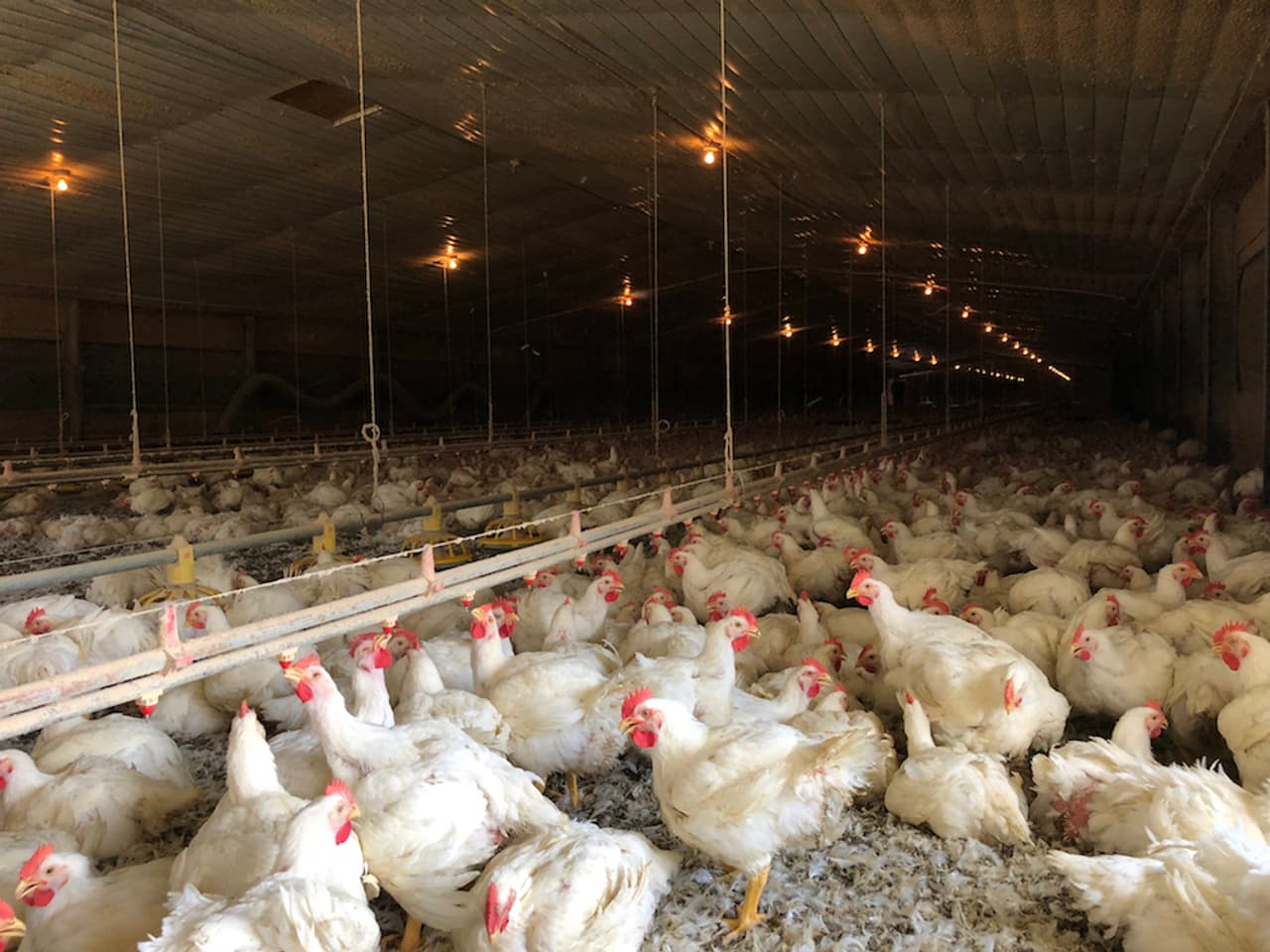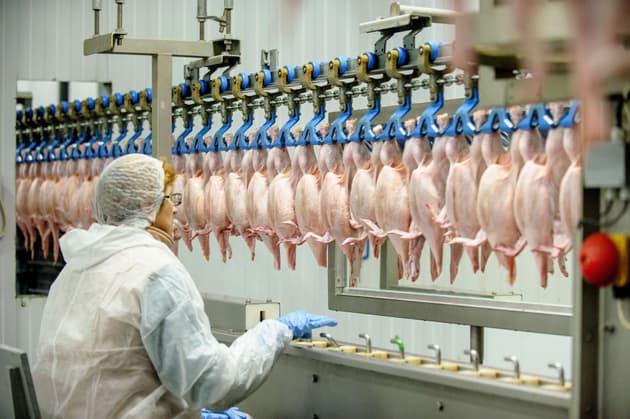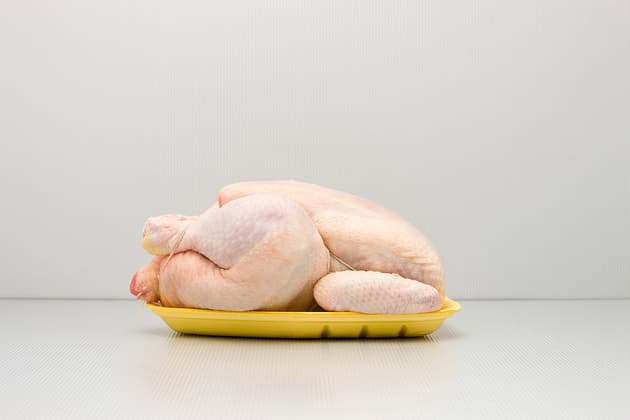
Suffocation, scalding, heat stress: Chickens suffer "inexcusable" welfare breaches at US abattoirs
Chickens slowly freezing to death, being boiled alive, drowning or suffocating under piles of other birds are among hundreds of shocking welfare incidents recorded at US slaughterhouses, according to previously unpublished reports.
Among them are “inexcusable” violations, say campaigners, who ask if the USDA’s current system, where inspectors issue reports when they see violations, really works. One inspector, who asked to remain anonymous, questioned the impact of those reports.
A joint investigation between the Bureau and the Guardian looked at hundreds of inspection logs from the US Department of Agriculture (USDA) detailing incidents in poultry plants across the country. In recent years, inspectors recorded numerous incidents where:
- Chickens suffocated to death beneath other chickens when they piled up on a conveyor belt that had stopped due to a mechanical failure.
- Chickens drowned after entering the scalding tank while conscious.
- Inspections revealed machinery failures and incidents of staff being inadequately trained.
- Thousands of birds died of heat stress after travelling or being left waiting in trucks in temperatures above 32 degrees C, or alternatively, freezing to death in extremely low temperatures.
In one incident in January this year, more than 34,000 chickens froze to death while being held overnight outside a slaughterhouse in a truck.
The investigation's findings have fuelled fresh concerns that following Britain’s departure from the EU, a post-Brexit trade deal with the US could see the UK flooded with chicken produced to lower welfare standards. This follows last year’s transatlantic row over chlorinated chicken which prompted political interventions in both countries.
The records include hundreds of instances in which groups of chickens and turkeys are bludgeoned, suffocated, scalded, frozen or heated to death. Repeatedly the inspectors note that the plants have not put in place adequate protection from the weather while the animals wait. However, they also note that after many reports the plants carry out retraining for workers.
These violations were witnessed between 2014 and this year at some of the largest poultry processors in the country as part of the national inspection system. The records, kept by the USDA’s Food Safety and Inspection Service (FSIS), were originally obtained through a series of Freedom of Information Act requests by the nonprofit Animal Welfare Institute (AWI).
 Campaigners called the violations "inexcusable" but many are not illegal
Campaigners called the violations "inexcusable" but many are not illegal
The USDA dictates rules for humane slaughter, but they only apply to “livestock,” which the US government considers separate from “poultry.” There are “good commercial practice” guidelines, but they are largely voluntary and not enforced. The USDA is not obliged to take any action against plants that violate these practices, other than writing up a report.
“We’ve learned that the incidents resulting in the most suffering are those related to the neglect or abandonment of birds during transportation and during holding at the slaughter plant,” said Dena Jones, director of the Farm Animal Program at AWI. “None of these incidents is covered by current USDA regulations.”
Birds that have died by a means other than approved slaughter methods – freezing to death for example - are considered “adulterated” and cannot be sold as meat. If several chickens drown in the scalding tank rather than enter the tank unconscious beforehand, demonstrating that the plant has “lost control of its process,” that can be grounds for a citation, or noncompliance report, in one of the few punitive options open to inspectors. The plant must then take action and fix the problem, and if they fail to do so, the USDA could close the plant or prevent its product from being sold.
The actual number of birds affected by processing failures is impossible to say. Reports are usually only made when more than six animals are deemed to have been harmed at one time, and inspectors may not always be present to witness a violation.
Animal welfare organisations have submitted legal petitions over the last few decades charging that the USDA is not fulfilling its remit to protect animals from undue suffering and the public from unsafe meat. The USDA has consistently responded that they do not have the jurisdiction to create such regulation.
“FSIS is a regulatory agency that ensures that laws affecting livestock and poultry are implemented in federal establishments across the nation,” said an FSIS spokesperson. “It would indeed require an act of Congress for poultry to be added under the Humane Methods of Slaughter Act.”
Several of the plants appear several times over a number of years, according to AWI. Case Farms, a company with plants in North Carolina and Ohio, has two plants that have received a number of reports, and Pilgrim’s Pride, one of the four biggest chicken processors in the US, has also had a number of violations in the last decade, analysis has shown.
“We take each circumstance of animal welfare seriously, and we encourage our employees to report any incident via an anonymous, third-party hotline for reporting of welfare concerns,” a representative for Case Farms said in response.
Make change possible
Investigative journalism is vital for democracy. Help us to expose injustice and spark change
Click here to support usPilgrim’s Pride, a subsidiary of Brazilian-owned JBS, the largest meat processor in the world, did not respond to our request for comment.
Asked if USDA guidelines are adequate, an FSIS spokesperson responded: “The violations you reference, when compared to more than 9 billion poultry carcasses we inspect annually, shows that our inspection system works.”
But a USDA inspector at a chicken plant in the southern United State said she questioned the efficacy of her reports.
“You have a document. That’s basically all it is,” she said. “It’s just a document stating what happened. And to me, that’s really nothing.” She also said that on several occasions she has brought welfare issues to the attention of her supervisor or plant employees, and no action was taken. “They just act like sometimes they don’t care.”
Yvonne Vizzier Thaxton, director of the Center for Food Animal Well-Being at the University of Arkansas, reviewed some of the USDA records and found “serious” and “egregious” violations. She said that instances involving large numbers of birds and mechanical failures are “inexcusable”. She believes employee training could alleviate some of the issues, but keeping a highly competent workforce is a challenge in the poultry industry. “We have a turnover issue. You have to constantly be training.”
The European Union has not allowed the import of US poultry in over two decades. Aside from different welfare regulations, US chickens are bathed in chlorine before being packaged for consumption, a controversial process that is not allowed in Europe.
However, with the UK’s imminent departure from the EU, concerns have been expressed that a post-Brexit trade deal with the US may open the doors to chickens produced to lower welfare standards.
“Once the market is flooded with cheaper imports [produced] to a different or lower standard then simply through price it can drive a wedge through our standards and we either compete in a similar way or lose production,” said Richard Griffiths of the British Poultry Council.
Clare Oxborrow, of Friends of the Earth, said the UK urgently needed a law to prevent UK standards being lowered, “plus guarantees to domestic producers that the standards they work to won't be undermined by low quality imports.”
 The findings have fuelled fresh concerns that meat produced to lower standards could flood into Britain following its departure from the EU
The findings have fuelled fresh concerns that meat produced to lower standards could flood into Britain following its departure from the EU
“Any future trade deal should explicitly prohibit importing food that isn’t produced to these standards. Crucially, this needs to apply to process and not just end result - the animals we eat deserve high quality lives, not high quality chemical washes.”
A DEFRA spokesperson said: “We have been absolutely clear that we will not water down our high food safety and animal welfare standards in the pursuit of any future trade agreements.
“As we leave the EU, we are committed to securing the best deal for the food, fishery and farming sectors. While it is vital that we explore new trading opportunities, these will not mean a dilution of the standards for which British food is world renowned.”
The US poultry industry slaughters about nine billion birds each year, a number the Trump administration is hoping to raise. In September, the administration released a plan to allow plants to bring their processing speed up from the previous cap of 140 birds per minute to 175.
The USDA inspector who spoke to the Bureau works at a plant that is allowed to operate under that faster line speed as part of a pilot program for the new policy. She disagreed that faster is better. “Slow the line down,” she said. “The birds are going 175 a minute. That’s a lot to try to kill in a minute.”
In August, AWI filed a lawsuit against the USDA alleging that the agency has an obligation to make its violation records available to the public proactively, without a FOIA request. The organisation would also like to see the USDA implement stricter enforcement for welfare violations.
“If good handling practices are important enough to be audited every day, in every plant, then they are important enough to be put into regulation,” said AWI’s Jones. “Otherwise, birds will continue to suffer and die in large numbers.”
Natalie Jones is a reporter at the Guardian
Header image of chickens at a farm in Texas via Shutterstock




